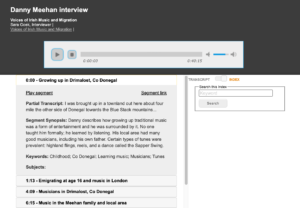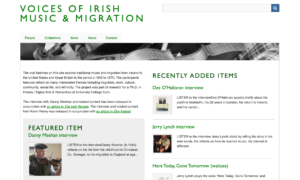I confess: I’m doing a Ph.D. in Digital Arts & Humanities. I also confess that when I’m asked what my Ph.D. is in I say History. Why? Because that’s my research area and at least people have an idea what history is. (Alright, sometimes the wrong idea – ‘Oh so you must remember loads of dates and stuff, right?’ Wrong. – But an idea nonetheless.) On a related note, I’m not yet convinced that digital humanities is actually a field of study rather than an umbrella term for a set of methodologies and beliefs shared across many fields. The third part of my confession relates to the aims and program of the digital humanities. Yes, I certainly think that new technologies can make a positive contribution to the types of research questions we ask in the humanities, the ways that we ask them, and processes of teaching and learning. However, I confess I find myself rather less than enamored by the way many scholars promote these goals in speeches and articles. Therefore I say I’m a skeptic not because I believe DH has nothing to contribute, but because I remain uncertain of the manner in which that contribution comes to force.
This post was prompted by reading Alan Liu’s article, ‘The State of the Digital Humanities: A Report and Critique’ (Arts and Humanities in Higher Education, Dec. 2011). Like many other articles on the status or definition of digital humanities, the reader gets the impression that he preaches to the converted, beginning with the very assumption that it is indeed a scholarly field and therefore merits attention as such. Another indicator of the fact that he speaks to those already familiar with the area is his excessive usage of what we might call ‘jargon’ (but Liu’s own research is in literary theory, so perhaps I shouldn’t be surprised by this). This type of language can have the detrimental effect of scaring off scholars who might otherwise express interest in what digital humanities has to offer. All DH scholars seem to expect the continued growth of the area, probably rightly so considering technology’s continued permeation of everyday life, but if the goal is for digital humanities to ultimately become synonymous with humanities in general and we don’t want to wait for a generation or two to go by for that to happen, then talking with and to current scholars (and the wider public) in practical terms that resonate with them would probably be a good idea.
For example, my first experience in digital humanities (though I knew nothing of that phrase at the time) was as an assistant/intern working with both the IT and History departments and my high school for three summers when I was in college. I’m not a tech-geek by any standards, but got on well with people from both departments and could therefore serve as a liaison between them. At the time, the school was adopting a one-to-one tablet laptop program and the history faculty wanted assistance figuring out how they could cope with and utilize the laptops in their classrooms. These are some of the best teachers and most intelligent people I know, but for some reason many found themselves intimidated by their own unfamiliarity with the technology. What scared them was not the fact that the students might draw maps digitally rather than on paper with colored pencils or the concepts built into a program such as Photoshop or the fact that the students might know more about the technology than they did, but the words. What does it mean if someone tells you to create a new layer in Photoshop and you’ve never used the program before? Very little. But start by saying that a layer is like a transparent sheet on top of the image so you can draw without affecting what’s underneath and it might click. The concepts behind much of the work in DH are straightforward and connected to those already present in the humanities generally, but start using acronyms and technical terminology and you lose a lot of people very quickly because it may not be clear to them if the time or effort it takes to figure out the technicalities just to get to the basic message will prove worthwhile.
Another aspect of Liu’s article that struck me is his discussion of the scale of digital humanities projects and the idea that they are constantly getting bigger. He writes, ‘scale is a new horizon of intellectual inquiry’, that all scholars should be able to access and analyze all the world’s digital information from anywhere; a lofty ambition indeed. This struck me as remarkably similar to the early emergence of social history – the ‘social’ aspect came to mean something covering the diversity of lived experiences (broadening the focus of the historical discipline to realms beyond the political and elite). Those associated with French Annales school of thought expressed the ambition to write ‘total history’, to capture all the variety of life. However, in practice historians came to understand that this could only fully take place on a relatively small, local scale. Though Liu mentions the Annales in the critique portion of his article, the second part of the realization of scale within social history seems to have failed to dawn on him. Big fish have their place, but in studying the whole ecosystem the small fish also deserve a mention.
To avoid ending the article on an entirely negative or critical note, I have a counter-proposal for the propagation of the digital humanities (whether or not we actually call it a ‘field’). First, preach to the unconverted in clear terms. In this regard, I think Ted Underwood’s article ‘On the Digital Humanities’ and the Journal of American History article/dialogue ‘Interchange: The Promise of Digital History’ (Sept. 2008) are much better places to start than Liu’s piece. Secondly, focus on smaller-scale applications of tools and methodologies. Make it clear how individual scholars or small groups with limited resources can gain from and contribute to the digital humanities, because they all have something to offer. Maybe once these issues take greater precedence I’ll become less of a skeptic.

